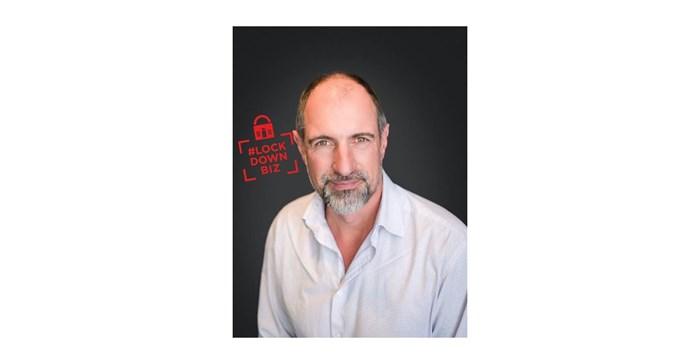Regulation has made financial services resilient to crisis, says Richard Rattue

Richard Rattue is the MD of Compli-Serve, which helps financial services businesses to mitigate their regulatory compliance risk in today’s environment. He talks us through how the company is adapting to a Covid-19 world.
What is a typical workday in the life of the lockdown?
I have tried to maintain my office routine. I’m dressed for the workday as I normally would be, only now I walk down the passage to my home office instead of taking my car to my real office. The workday is much the same, but with digital meetings featuring, instead of face-to-face. I typically schedule between two and four collaborative calls per day, primarily on MS Teams or Zoom. Compli-Serve is a knowledge-based business, so lockdown doesn’t impact our ability to operate, and that’s basically thanks to moving to the cloud. We couldn’t possibly operate the same way we are now through our old “virtual private network” due to complexities and cost, so the cloud is our saving grace. Have we been operating at 100% capacity? No, but we are probably in the high-80s We’re still able to conduct business, and while it’s not the same as before, we are coping well to date and feel fortunate compared to friends in the non-essential retail sector.
What was your initial response to the crisis/lockdown and has your experience of it been different to what you expected?
My initial response was certainly some degree of concern as to the impact on our lives. Our exco hunkered down to assess what we were facing. We were lucky that most of the big picture planning was already in place, but an example of something that caught us off-guard was having to spend more than needed on laptops to accommodate all staff from home. Unfortunately, due to stock shortages, we had to purchase high-end laptops for lower level admin tasks, costing us more than we should have spent for those devices.
I became more (though quietly) confident when I realised, we should be fine overall. I’m not sure how “fine” yet, but a large portion of our company was already used to working remotely. Our compliance officers’ team are road warriors who typically work from home offices, coffee shops, malls, or outside school waiting to pick up their kids. So, we were equipped with some advantage in that it hasn’t been as much of a transition for them. More challenges were presented with our back office and finance teams.
What impact has Covid-19 had on your company, the industry or economy as a whole
The impact on our company has been a glancing blow rather than a hammer blow, which I am happy to say. For the economy as a whole, it has unfortunately been a hammer blow. There is sadly no getting around that and we will all feel this in the months to come as the economy contracts. The financial industry itself is far better positioned to work away from office than other industries, and that is partially due to regulation, which forces financial firms to have business continuity and back-up procedures in place.
Regulation has helped to prepare financial services for this unexpected crisis
Comment on the challenges and opportunities
The challenge in my role as MD has been managing the different personality types within the team; some of whom work very well on their own and some who are less inclined to do so. You find mental resilience can droop, so as a leader, I think it’s important to be a torch bearer. If you come across as downcast, or depressed and uncertain, that is not what your team wants to hear (even if you have your doubts or dark days). Some people are more vulnerable to cabin fever and depression than others. Taking away cigarettes and alcohol, even though there are warranted reasons for doing so, does have an impact on individuals where you are taking away their ‘’nice’’ or ‘’must’’ haves. We are all just trying to get through it as best we can.
The world has really turned to innovation during this time. Why do you think this is the case and what does this mean for the industry, your company and the economy?
The lockdown will accelerate the fintech revolution as it has accelerated the work from home revolution. This isn’t going to be over in six months. They say it could be two years for a vaccine, but then they need to manufacture hundreds and millions of doses. The ‘’new normal’’ could be around for a long time, and even remain. I don’t think we will ever get back to where we were entirely. I think that by the time a vaccine comes out, we will be so used to this new environment.
The opportunities are there for the ‘sunrise sectors’, which are mostly in the online space, accelerating the demise of ‘smokestack industries’ that are not online and tied to large overheads. I feel that firms that cannot migrate to some form of online presence, are going to struggle or fail in the times ahead. In financial services, it remains unlikely that the regulator will be undertaking on site visits for some time to come, and will be relying on regtech, which is likely to expand exponentially as well.
About Nicci Botha
- #WomensMonth: Prudential's Leshni Dial-Harikaran on the beauty of a perfectly balanced spreadsheet - 10 Aug 2021
- #WomensMonth: MiWay's Mologadi Kekana on the importance of financial independence - 6 Aug 2021
- #WomensMonth: Mamedupi Matsipa's passion for finance charted her career path - 5 Aug 2021
- #WomensMonth: Standard Bank's Simone Cooper asks, "How does your business grow?" - 4 Aug 2021
- #WomensMonth: Twané Wessels, product actuary at Just SA - 2 Aug 2021
View my profile and articles...